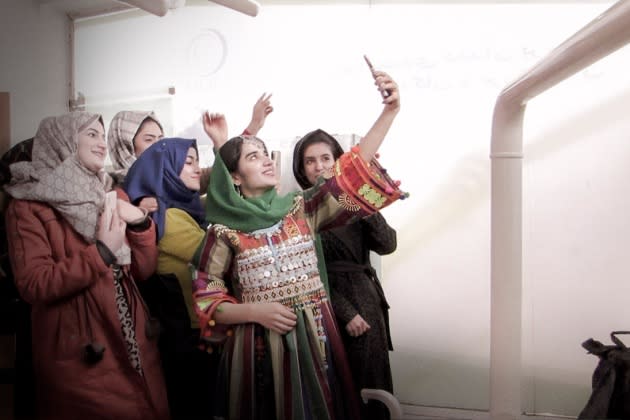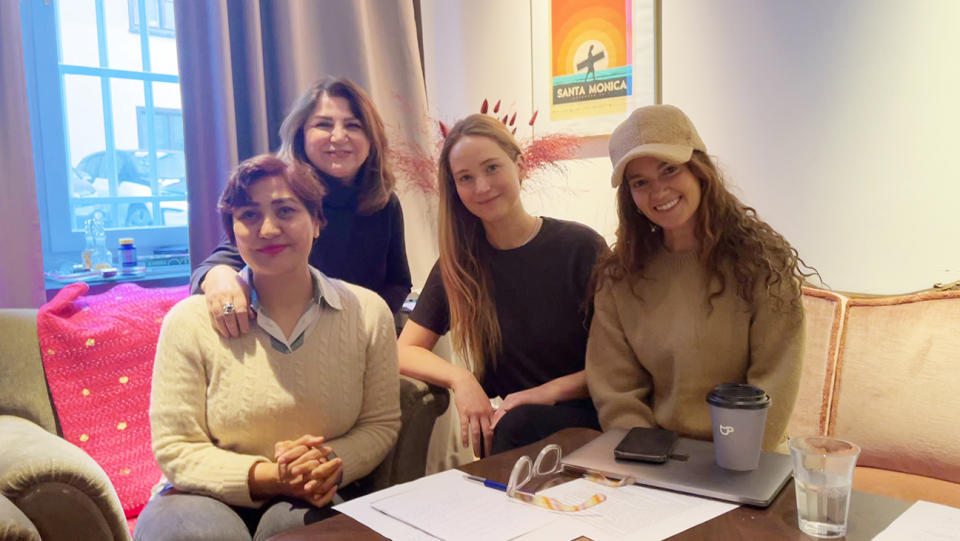Cannes: Behind the Jennifer Lawrence-Produced Doc ‘Bread and Roses’ About Women in Taliban-Controlled Afghanistan
- Oops!Something went wrong.Please try again later.

In August 2021, the fall of Kabul was seen in news coverage taking place in real time, as the Taliban took hold of Afghanistan’s capital only a few days after the American armed forces pulled out of the country following a two-decade-long presence. After 20 years of hard-won gains, under Taliban rule, women in the country were almost immediately barred from education after the sixth grade, could not leave their homes without a male chaperone and were barred from working.
Afghan filmmaker Sahra Mani had left her home a few days prior to Kabul’s collapse to attend a film festival in Europe. Unbeknownst to her, she would not return. “I never thought, ‘This will be the last time I pack my suitcase and close my door,’” says Mani, who is currently living in France. “Even now I don’t remember if I closed my window properly or not.”
More from The Hollywood Reporter
Arnold Schwarzenegger on Bruce Willis' Retirement: Action Stars "Never Really Retire...They Reload"
China Box Office: 'Fast X' Roars Past $100M, 'The Little Mermaid' Struggles to Stay Afloat
The Hollywood Reporter Critics Pick the 20 Best Films of Cannes 2023
Like many in the West, producer Justine Ciarrocchi and Oscar winner Jennifer Lawrence watched the media coverage from thousands of miles away and felt a growing concern when the news cycle, as it always does, moved on. “Obviously, the Middle East is extremely complex and very far away and after you see things on the news so much, it can make something safely two-dimensional,” says Lawrence. “The fear of everyone moving on and forgetting led us to try to make something more permanent.”
At the time, Excellent Cadaver, their production banner, was only three years old, with a single feature to its name — the Lawrence-starring Causeway, which was waylaid by the COVID pandemic — and neither creative had ever worked in the world of documentary filmmaking. “The consequences for women were dire,” says Ciarrocchi. “We had a pretty immediate reaction, and Jen’s first response was to find an Afghan filmmaker and give them a platform.”
A Thousand Girls Like Me, a 2019 documentary from Mani, drew Lawrence and Ciarrocchi’s attention. It follows a woman in Kabul as she seeks to take legal action against her sexually abusive father, telling her story on national TV as the whole of Afghanistan watches. “In a moment when documentaries can feel didactic,” begins Ciarrocchi — “overly political,” interjects Lawrence— “[A Thousand Girls Like Me] feels like a story about human beings. It feels like an art piece. Politics are inherent to the story, of course, but that was not the purpose.” They reached out to Mani and offered to produce a doc about the experience of women in a Taliban-run Afghanistan, filmed in whatever way she saw fit.
At the time, Mani was already in the middle of another project and was not prepared to start something new. Knowing she was a filmmaker with work that focused on human rights, women friends and acquaintances had already started sending her videos from inside Afghanistan, with Mani archiving the footage as she received it. She recalls thinking, “Even if I cannot make a film at the moment, let’s at least document their brave acts.” As the footage continued to come in, the filmmaker saw the makings of a documentary. “Many women were killed, disappeared or tortured,” says Mani. “They don’t want much— to go back to school, to go back to their jobs. I knew these people; these women deserve to live their lives. These women also have dreams and stories to tell.”
After a month of collecting footage from around the country, a 12-minute sizzle reel was put together for Ciarrocchi and Lawrence to show to potential financiers. “It’s tough to raise money for a documentary that is capturing something in real-time. To ask a financier to take that gamble is tough,” says Ciarrocchi. There were questions about how and whether filming could continue to take place amid so much conflict.
Documentaries made in active conflict zones, as political powers and governments collapse and shift, intermittently premiere at festivals and in awards season. As Bashar al-Assad’s military and rebel forces waged war in the Syrian city of Aleppo, films like Last Men of Aleppo and short The White Helmets, the latter of which would go on to win an Oscar, documented the destruction. More recently, documentaries have begun to emerge for the Russian war on Ukraine, like 20 Days in Mariupol, which premiered at this year’s Sundance Film Festival. Still, it is rare that these docs, produced in the immediate aftermath or concurrent with armed conflict, center on the experiences of women.
Mani’s eventual doc, Bread and Roses, found funding from an independent financier, Farhad Khosravi, credited on the film as a producer. It was at this point, says Ciarrocchi, “we stepped back and didn’t see more material until [Mani] shared her first assembly.”
The film focuses on the day-to-day realities of three Afghan women: A refugee who fled the country, a woman who runs an activist group out of her former dental practice, and a one-time government employee wrestling with her new homebound reality, weighing the dangers of public protest. Shooting on and off for a year, Mani relied on the women to film themselves — on a mix of cellphones and cameras — with the help of the occasional professional cameraman still on the ground. The film chronicles the women’s lives in the immediate aftermath of the Taliban takeover, including thwarted attempts to leave the country, the organization of protests, threats, physical violence, and eventual jailing.
In watching the first cut of the film over a year after Mani began the project, a moment that stuck out for Lawrence was when Zahra, the dentist turned activist, is sitting with her husband in a near-empty Kabul restaurant and plainly stating that women’s oppression begins at home with their fathers, brothers and husbands — a dangerous sentiment to state in public, let alone film. “That’s just what she said to her husband over dinner,” notes Lawrence. “You can give anyone a camera, but these three women are so courageous.” For Ciarrocchi, she was struck by the everyday attitudes of the women. “One of the major discoveries for us was that people suffering under these kinds of circumstances are somehow still able to laugh and put on lipstick and heels and march out the door.”
As would be expected for a documentary about an ongoing humanitarian crisis, Bread and Roses ends “on an ellipsis,” says Lawrence. “I was thinking about how to tell their story rather than how to end the film,” adds Mani. “There is not an ending at the moment for our people’s misery. They keep suffering, they lose everything they have, every day.” (The three women featured in Bread and Roses are now located outside of Afghanistan.)
Postproduction, somewhat fittingly, took place in Iran. Bread and Roses, a film about women’s rights in Afghanistan, was being cut in a country whose women, spurred by the death of Mahsa Amini while in the custody of the Iranian police, were pouring into the streets to demand government changes. Due to spotty Internet access in Iran, it took two days for Ciarrocchi and Lawrence to reach Mani to tell her that Bread and Roses had been accepted into the Cannes Film Festival as a special screening. Upon learning the news, Lawrence says, “We lost our shit.”
When they launched Excellent Cadaver, Ciarrocchi and Lawrence had not expected to make documentaries, let alone one with the production difficulties inherent to Bread and Roses. “This came out of necessity,” says Ciarrocchi of Bread and Roses. But would they make another documentary? “It is not a central part of our company’s mission but, if we are moved by something …” Lawrence finishes the thought: “We are going to try to make it.”

Best of The Hollywood Reporter

